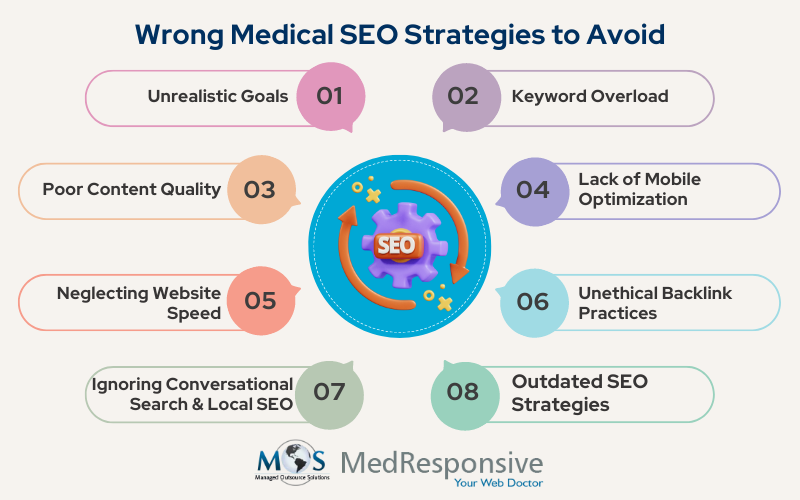Many medical practices unknowingly make mistakes and even the most well-thought-out and meticulously implemented SEO strategies can fall short at times. When you don’t receive the links and traffic you were hoping for, despair sets in when you consider how much time and effort you have invested in the project and how much more work will be required to meet your objectives. In SEO, it’s not unusual to see results that fall short of expectations. However, you don’t have to let that depress you. All you have to do is evaluate your strategy and find out what went wrong, draw lessons from it, and adjust your next plan of action accordingly. A reliable healthcare digital marketing agency can help you implement the right SEO strategies and boost your online visibility and traffic.
Wrong Medical SEO Strategies You Must Avoid
- Aiming Sky High Works, but Not in SEO: There can be many reasons why SEO practices fail. What we are talking about here are the most common reasons for the failure of SEO strategies – failing to understand the scope of SEO and, as a result, aiming for unrealistic targets. This often leads to disappointment since SEO is a gradual process and not an instant reaction.
- One Keyword at a Time: The best way to move ahead is to begin optimizing for a single keyword, because you are not going to get top ranking for multiple keywords overnight or even in one or two months. First choose one keyword that most appropriately describes the products or services you offer and is also what your potential patients are likely to search for. Keyword research tools can help you here. You need to see how much success you attain with that keyword before you build on that success and branch out to other keywords. This step-by-step process can help you attain real progress.
- Not Writing Good and Informative Content about your Medical Practice: A typical mistake in medical SEO is not writing good content. In an effort to raise ranks, SEO tactics emphasize technical details and keyword stuffing. Writing for readers rather than search engines is necessary for efficient medical SEO, nevertheless. Content should be produced for patients who might not comprehend medical language; it should be straightforward, educational, and accessible. Content that is easy to read and comprehend can raise its search engine ranks and draw in more users. Examine highly ranked medical websites to confirm this. These websites usually don’t stuff their content with keywords; instead, they concentrate on offering clear, helpful information. Developing interesting and instructive information that appeals to readers is the secret to success. This strategy improves SEO and raises the possibility of attracting new clients. Also, make sure to create unique content and post your content consistently. Do not copy content from other websites, it can lead to penalty.
- Not Having a Mobile-optimized Website: It’s critical to optimize websites for mobile devices, as there are over 3.5 billion smartphone users worldwide and 77% of Americans use them. Approximately 62% of consumers make purchases using their phones, underscoring the need of mobile accessibility for companies, particularly those in the healthcare industry. A website that is optimized for mobile devices can attract more visitors by streamlining online appointment scheduling, information access, and medication management. Due to search engines giving preference to mobile-friendly websites, accessibility can both improve user experience and help you perform better in search results. Although mobile optimization can be complicated, working with an expert can guarantee that your website is built properly and runs well on all platforms. Reaching a wider audience and remaining competitive in the digital sphere require investing in mobile optimization.
- Not Monitoring Website Speed: Both SEO performance and user experience are greatly impacted by website speed. When a website loads slowly, users are more likely to give up and visit another one. Medical SEO specialists advise a load time of three seconds or less for the best outcomes. The speed of their website is something that many digital marketers overlook, however it has a big impact on search engine results and visitors. A slow website not only bothers consumers but also reduces the likelihood of getting new patients. It is important to concentrate on techniques such as allowing compression, decreasing redirection, utilizing browser caching, eliminating JavaScript that blocks renders, and improving server response time to increase the speed of the website. Furthermore, loading speeds can be improved by optimizing images and videos. Medical websites can increase user satisfaction and overall SEO success by prioritizing speed optimization, which will ultimately draw and keep more patients.
- Getting Backlinks the Wrong Way: Particularly for medical offices, backlinks are a vital technique for increasing SEO and search engine rankings. These are connections pointing to your page from reliable websites that may increase traffic and draw in more patients. To manipulate SEO results, some people, however, turn to unethical means such as building private backlink networks. This technique, which is sometimes called “cheating,” might result in Google penalties, which will hurt rather than help your website’s exposure. The best course of action is to concentrate on organic SEO techniques, such as creating original, useful content and employing thoughtful keyword research. These techniques build backlinks organically without going against Google’s policy. Getting backlinks from legitimate sources improves your SEO results and establishes your authority with search engines and prospective clients. A more durable and successful strategy to obtain long-term SEO success is to invest in high-quality content instead of taking short cuts.
- Conversational Search and Local Optimization: When you select keywords, make sure you take into consideration conversational search. Conversational search is quite important these days for Google since that’s how people like to search. People sometimes perform consecutive searches regarding various aspects of a particular topic. So, your webpage must contain information dealing with all those aspects of the keyword you’re optimizing for. And, make sure you focus on geo-targeted search for local optimization. If your keyword is “laparoscopy”, make it “laparoscopy in NYC”, “laparoscopy in LA”, etc. depending on where your practice is based.
- Not Updating Medical SEO Strategy Timely: Since the internet is always changing, your website may no longer rank highly or appear on the first page of search results if you don’t make frequent changes. Being aware of Google’s algorithm updates and modifying your plan accordingly is one way to keep up good SEO. It’s critical to keep an eye on your medical website’s performance and modify your content marketing strategy in response to emerging trends to make sure it remains relevant. Regularly examining analytics might help discover issues influencing your rankings. Creating excellent content is a solid starting point for medical SEO, but you should review your approach if your website’s traffic is decreasing even with paid advertising. Maintaining or raising your rankings and drawing in new patients can be achieved by regularly upgrading your SEO strategy.
Whether you’re new to the industry or not, implementing paid or organic SEO for medical offices can appear complicated. On the other hand, you can greatly increase the exposure of your website and expand your patient base by comprehending and implementing the appropriate tactics. You can improve your medical practice’s visibility locally and globally by utilizing healthcare SEO services and concentrating on producing informative, patient-centered content. In addition to raising your search engine results, an optimized website will facilitate potential patients’ access to the information they require, hence boosting patient inquiries and engagement.





